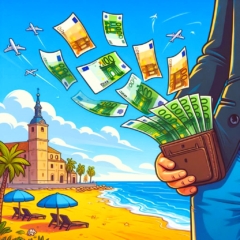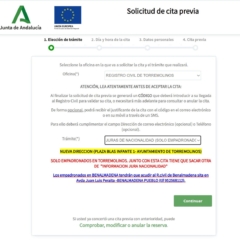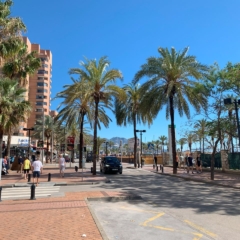Spanish nationality by residence – a complete guide

I’m in the process of getting Spanish nationality by residence! If its successfull, I will have double nationality – I’ll keep my original, Brazilian nationality, and get the Spanish nationality as well, something that is possible in a few cases which I’ll explain further ahead. The requirements and procedure are not so difficult, though they are a bit bureaucratic, take a long time and are certainly not cheap; in this post I explain it all in detail, plus share my own experience and all the links, so you can (try to) become Spanish too. 😉
Overview
As usual around Mama Málaga, we favor official information whenever available, and I’m glad to inform we have official sources for everything regarding how to obtain Spanish nationality by residence! We start with the ruling, which is given by the Código Civil (Civil Code), Articles 21 to 24. It requires:
1. Some time of residence in Spain (Art. 22.1 to 22.3);
2. Good civil conduct (Art. 22.4);
3. Proof of integration into the Spanish society (Art. 22.4).
The Ministry of Justice, that defines the procedures to obtain the nationality, further elaborates on the requirements of the Codigo Civil. It requires copies of the passport(s) of the person that is trying to get the Spanish nationality and of Spanish ID Document (TIE or Greencard and NIE), probably as a means to prove for how long the individual has lived in Spain (Point 1, above). It also establishes the requirement of a certificate of criminal record from the country of origin to prove good civil conduct (Point 2), and exams by the Institute Cervantes as proof of integration into the Spanish society (Point 3).
Instituto Cervantes, in turn, clarifies that a DELE, level A2 should suffice as proof of enough Spanish language skills for obtaining Spanish nationality, and that the CCSE exam is enough to prove knowledge of the Spanish Constitution and culture, and therefore, integration into Spanish society.
These are the three relevant institutions and/or sources of information when it comes to obtaining the Spanish nationality. Now let’s dive into the details, starting with the requirements.
Requirements
Time of residence in Spain
Sure, but for how many years? That varies. According to the Civil Code, Art 22.1 to 22.3:
– 10 years is the general rule;
– 5 years for those who obtained refugee status in Spain;
– 2 years for nationals of Ibero-American countries (I’m here!), Andorra, Philippines, Equatorial Guinea or Portugal, as well as for Sephardic Jews;
– 1 year for people who were born in Spain but didn’t get registered as Spanish, for those who are married to Spanish citizens, widows or widowers of Spanish citizens and born-abroad descendants of Spanish citizens, up to grandchildren.
In all cases, the residence must have been legal and continuous before the request. It means that if someone lives in Spain for 10 years, then move abroad and comeback, the time-count restarts; it also means that time spent illegally in Spain doesn’t count.
To prove for how long one has lived in Spain, the Ministry of Justice of Spain, that is the institution that actually processes this request, will require one’s Passport and Spanish Residence Document. In case the current valid Passport does not encompasses all the years of residence that need to be proven, previous passports need to be shown, too. As for Spanish Residence Document, this can be either the TIE or the greencard, depending on which applies; TIE is for non-EU citizens; greencard is for EU citizens.
Good civil conduct
The Ministry of Justice requires we present a criminal record certificate from our country of origin, translated and legalized. I’m sure the Ministry of Justice will conduct their own research of criminal conduct in Spain for those applying for nationality, so that’s great – one less thing we need to provide. But we do need to prove we have been good where we were born.
The hard part here is that this document needs to be translated and legalized. I dislike this last word very much. Legalized generally means that it needs to receive the apostille (which can be hard to get, because it needs to be done in the country of origin of the document). For countries that do not take part in the Haia Convention, legalization is something that can be done in a Consulate, which is a lot easier to obtain.
It also needs a translation, by which I assume they mean sworn translation (traducción jurada). To get this I looked for ‘traducción jurada near me’ on Google and found quite a few; it’s good to know I’ll be able to choose among a few price quotes when I get to this step.
Pass the tests by Instituto Cervantes
Approval on DELE level A2 and CCSE exams by Instituto Cervantes are also requirements to obtain Spanish nationality. DELE is a language exam, which can be taken on several different levels. The A2 level is a basic level of Spanish; it is not a difficult level to obtain. People who originate from Spanish speaking countries do not need to take this exam. The second exam required is the CCSE, a test on Spanish culture, fundamental organization and social norms. This exam is actually quite interesting.
The information that Instituto Cervantes provides on each of these exams is outstanding. They give examples of previous exams, offer free material to study (for the CCSE) and sell courses for the DELE. The DELE A2 level involves multiple choice questions, audio and written composition exams.
The CCSE is simpler: there is no need to write, as all questions are either multiple choice or true / false types. Also, the questions that can appear on the CCSE are all listed on the study material: there are 280 questions in the preparation material, of which 25 will be on the exams; and there is even a free app to practice for the questions! That being said, I’ve read the CCSE preparation material (about 100 pages) and though it is interesting and written in simple and easy language, I’m not so sure that an A2 level of Spanish would be sufficient to understand the content.
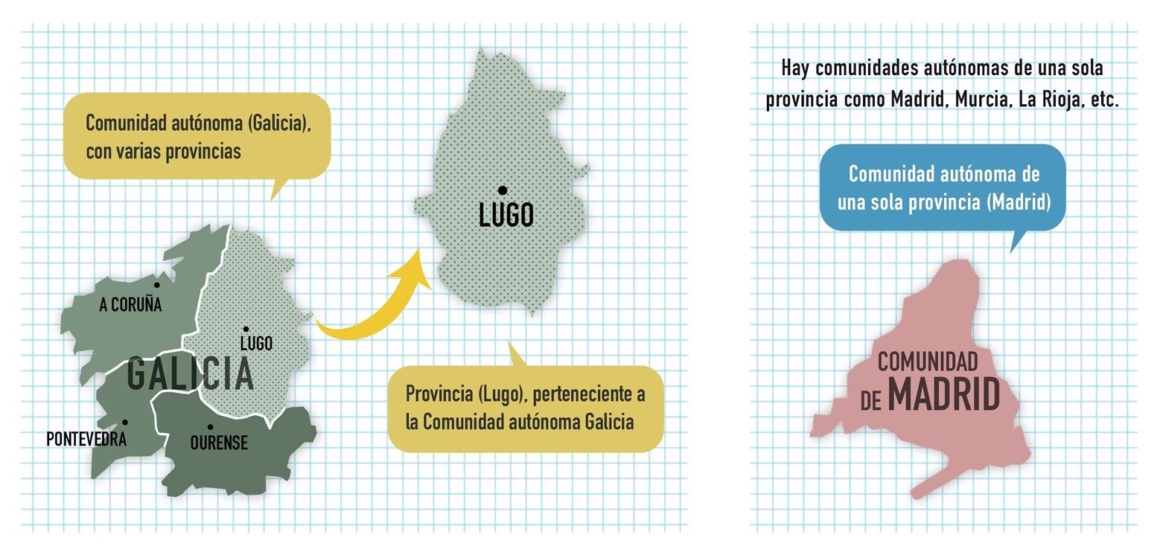
One can enroll for both the DELE and the CCSE exams online, on the links in this section, that lead to Instituto Cervantes’ page. Make sure you use your NIE as a document to enroll on Instituto Cervantes page and to enroll on both exams, as well as to bring NIE and passport on the exam’s day – it is a requirement.
There are many options of places to take these exams in each province of Spain; in Malaga, there are several places in Malaga city, two in Marbella and even one in Benalmadena. The prices of the DELE vary according to the place where they are taken (mine cost € 134), while the CCSE has a fixed price of € 85. The exams happen almost once a month (10 exams per year), but the places that offer the exams can run out of available space sooner. I managed to book my CCSE for the following month but had to book my DELE exam for two months later.
According to Instituto Cervantes:
– CCSE results are expected about 20 days after the exam, which can be retaken once, without additional payment, in case of failure to pass; an approval is valid for 4 years.
– For the DELE, results can take up to 3 months to be released, a new chance requires a new payment, and an approval on the DELE does not expire.
Other documents
Birth Certificate translated and legalized. Yep, here we go again. Much like the criminal record, that we have talked about previously, this is a document that needs to be obtained from one’s country of origin, then legalized and translated. It’s not clear to me why it is necessary, as it doesn’t prove time living in Spain, good conduct or integration into the Spanish society; I suspect the authorities just want to make sure they’ll have the birth certificate of all its citizens – thinking positive, right?
Modelo 790 026. This is just the form that needs to be filled out to start the procedure, much like we also needed to fill out specific forms for the NIE and Residence documents. We will talk more about it in the next topic, procedure.
Procedure
It all starts by accessing the webpage of nationality by residence of the Ministry of Justice (shown below – further referred to as “the page”). There you will find options to start the procedure in person or online. We’ll look at the online process, because it is very practical, and it is the one I’m doing for myself. Doing it online brings one extra requirement, that is to have the Digital Certificate, which should not be a problem for those who have been living in Spain for years.
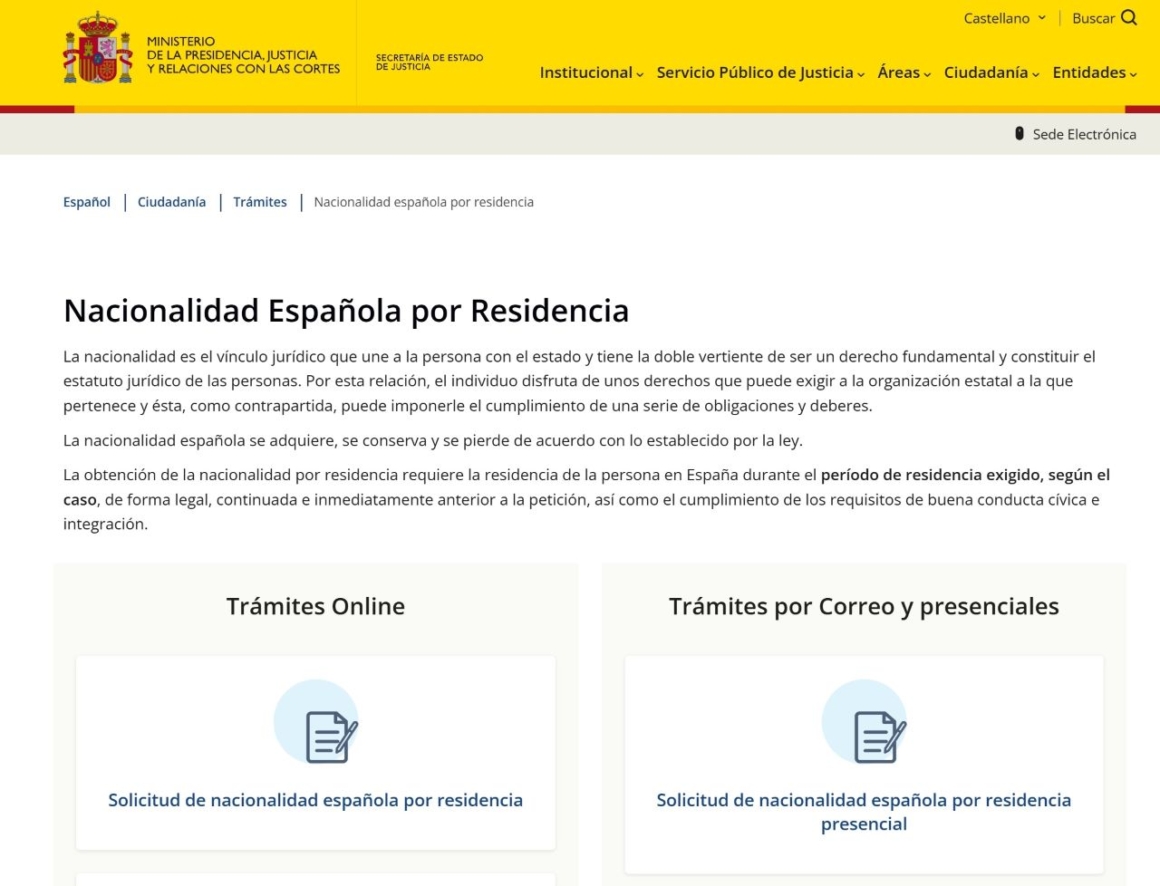
Clicking on the link under Trámites Online brings you to a page full of important information that I show below with some highlights of my own:
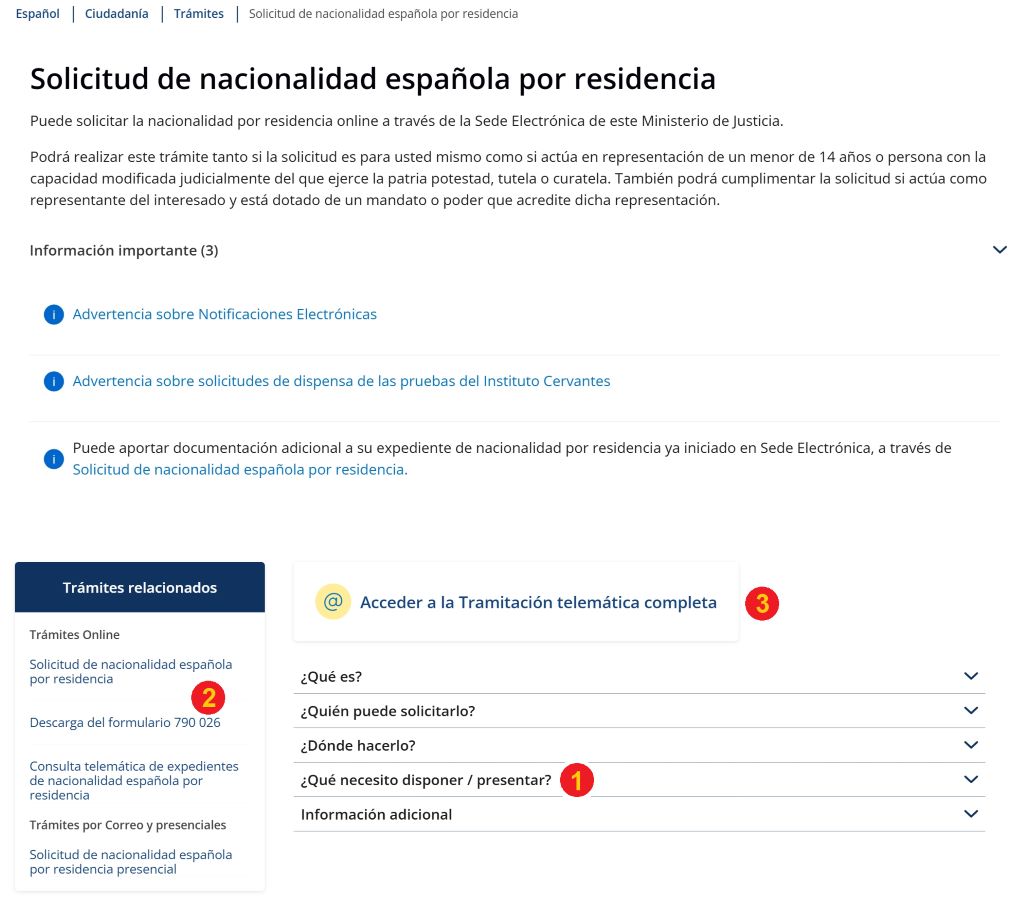
Opening the tab “¿Qué necesito disponer / presentar? “, marked as 1 above, you’ll find the list of requirements we have discussed before, including instructions on how to pay the form 790 026, that you can download from the link marked as 2. The link marked as 3 actually leads you to the same page as the link 2 (!), part of which we see below:

Clicking on the second link, that reads Descarga del formulario 790 026 opens a pdf with said form. You can fill it in, print it and pay it in person, in a bank, according to the instructions of the form 790 026. As of today, the fee costs € 104,05.
Once you have all the documents required and the paid form, you can access the first link – Solicitud de nacionalidad española por residencia – to start the process of uploading the documents. Notice that even though it is possible to come back to this request to complete it on different days, the second paragraph of this same link states that we have 4 months from the creation of the request to finish it, so it is better to make sure everything is prepared (or almost) before starting; as we’ve seen before, the results of the DELE can take up to 3 months to be published, so you should at least have this part concluded before starting the request.
How long until the Spanish nationality is conceded?
Between 4 months and a year. Apparently, it used to be closer to 1 year, but since 2022 it has speeded up; it ultimately depends on how many requests the administration has.
Once the request has been approved or denied, the Ministry of Justice notifies the interested party of their decision. The situation of the process can also be verified, regardless of notification, on the page of the Ministry dedicated to that.
Registration
And that is not all! Once the nationality request has been approved, it must be registered; failing to do this step in 180 days from the concession voids the positive result! This part of the process is also regulated by the Civil Code (Art. 23). It actually requires 3 things:
– an oath promising allegiance to the King and obedience of the Spanish Constitution and laws;
– a declaration renouncing one’s previous nationality (but there are exceptions: Sephardi Jews originating from Spain and nationals of Ibero-American countries, Andorra, Philippines, Equatorial Guinea or Portugal don’t need to do that. Ibero-American countries are those countries in the American continent that were once colonies of either Spain or Portugal – first time I’m glad Brazil was once a colony!)
– registration of the nationality acquisition in the Civil Registry.
The page of the Ministry of Justice we called “the page” in the Procedure part of this post establishes that all these things are done at the Civil Register corresponding to the place where you have your Padrón. Hopefully all done in one visit, but that is not clarified. (Edit: it is not in one visit. It takes at least two, maybe three! This stage is harder than I thought; so much so, I added a post just about the registration part.)
How to find the Civil Register that corresponds to your residence? Easy peasy, the Ministry of Justice has a page for that too! I found there that the one for Benalmadena is actually in Torremolinos:
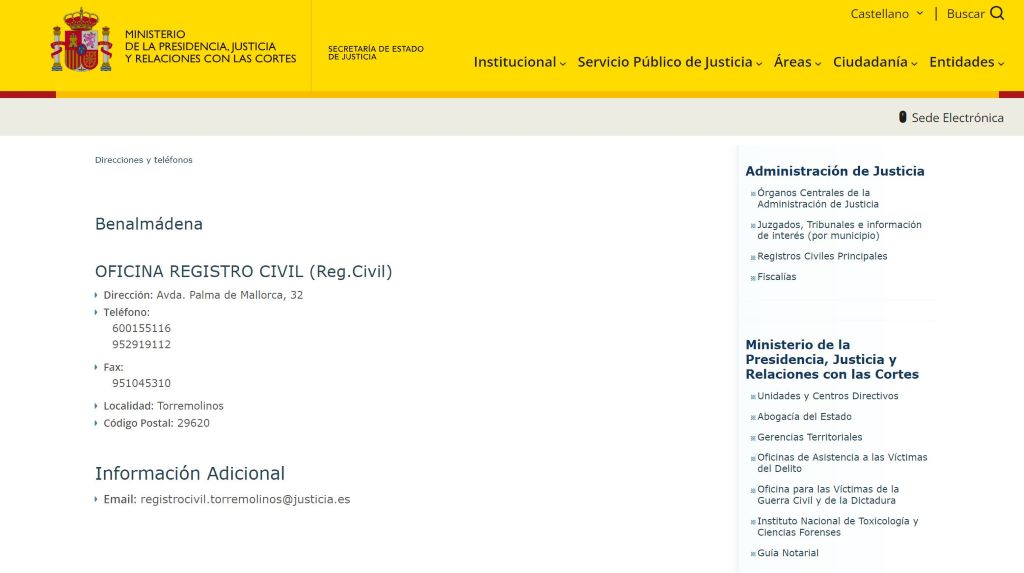
After registration, finally, you become a new Spanish citizen!!! Congratulations!!!

How my own process is going so far
I started looking into the Spanish nationality for myself back in May 2024, when I got to know that Brazil was now accepting their nationals having a second nationality by naturalization. Brazil has long accepted double nationality as long as they are both original, “from birth” nationalities; but getting a second one by option – naturalization – could cause the loss of the Brazilian nationality until recently.
I was not willing to risk losing an original nationality for a naturalized one, which is, in some ways, a bit less than an original. I was also glad to notice that, as I’m Brazilian, Spain would not expect me to renounce my original nationality; as it is fine with both countries, I feel free to do it.
I started reading the requirements and noticed that, for me, the hardest part was going to be getting the Brazilian documents – the birth certificate and the criminal record – not so much for the documents themselves, but because of the apostilles – a pain in the lower back. I have my birth certificate – the original one, almost falling apart – and getting a Brazilian criminal record is something that can be done online in a minute; but getting the apostille for them is only possible in Brazil – as any apostille can only be issued in and by the country that issued the original documents.
I ordered a new birth certificate, with the apostille, from a company that deals with notaries in Brazil, in the end of July. I paid around € 130 for this. I’m waiting for it to be delivered… their requested time of two months is about to expire, and I haven’t heard from them yet. For the criminal record, I saw the consulate does a legalization of this document; I’ll try doing this instead of the apostille, and hope it is accepted as, essentially, a consular legalization is the same as an apostille – both are official validation of a document by the country that issued it. It will cost me around € 20 and get done in a week or so.
Consular legalization is the process that was used before the apostille thing started, and is still in place for several countries. For Brazil, that uses the apostille, I’m actually lucky that the Consulate accepts to legalize at least the criminal record. Ironically, the apostilles came to make the process of accepting a foreign document easier; in reality it made it so much harder, super expensive and very time consuming.
Once I get these two documents, I’ll get them translated to Spanish by a sworn translator. I believe it’s better to do the legalization first, then the translation next because then the legalization gets translated as well; I think it makes sense, right? I’ve already found quite a few sworn translators of Portuguese to Spanish in Benalmadena; they said it would take two or three days but didn’t give me a price quote. Google says it costs between € 30 – € 70 euros per page. Ouch!
I enrolled in both DELE and CCSE exams on September 18, 2024, when I started writing this post. I’ll do the CCSE in October and the DELE in November, both in Benalmadena. I have read the CCSE study guide, and enjoyed the read; I do believe I can pass both, but I have been watching some more Netflix in Spanish, just in case…
Doing the DELE in November means I may have to wait up to February 2025 for the results. I’ll wait to pay the fee of the Form 790 026 only after I get that, as by then – hopefully – I’ll already have my apostilled birth certificate, legalized criminal record and CCSE (positive) result. That’s when I’ll finally upload the data all at once and start checking for the resolution on the page of the Ministry of Justice. I’ll update below as news on my process come.
Updates on my process
October 28, 2024: I finally received my apostilled birth certificate from Brazil. It took me 3 months and one online complaint, but it is here now! I’ll do the CCSE very soon and the DELE next month; after that, I can send the other document (the criminal record) to the Brazilian Consulate to get the legalization done. I would rather not send before the exams, because I’ll need to send my passport to the Consulate too, and I don’t know if it would be back on time for the exams.
December 05, 2024: I did both exams and already received the test result for the CCSE (I passed). I changed my mind about doing the legalization of the criminal records, because the Consulate page itself informs that sometimes it is not accepted by the Spanish authorities; so I’m doing for the criminal records the same as I did for the birth certificate. I hope this time it can be faster.
January 2025: I received my apostilled criminal records from Brazil.
February 2025: I received the DELE results – I passed! The same day, I found a sworn translator in Benalmadena (Andraca Y Román). They got right at work: I got the digital version of the translation in 3 business days and the translated documents in one more day. Now I had everything to start the procedure – which I did. I included all the documentation in one go, even though one can keep adding documents for 4 months.
A few observations about the procedure:
– they ask to include all the pages of the passport as one pdf document, which should not be larger than 5MB. I couldn’t do that (I suppose zip files are not allowed, because it expressively says only .pdf extensions are accepted). So I added 3 .pdf files, each with a third of the passport. Let’s see if it is accepted.
– as soon as I concluded the procedure, I received a receipt confirming I had submitted the document. I saved it. I then went to the consultation page of the Ministry of Justice, to check the status of my request – not because I had hopes of it being approved, but to familiarize myself with this part of the process. It didn’t recognize my data!!!!! I don’t know if it is too recent or what other problem may be. It kept saying my NIE and register number didn’t match, but I was copying those from the receipt… I’ll wait a few more days and try again.
– I waited ten days (because it’s carnival and my head is in the parties!!) and then tried again using the consultation page: success! No, it is not concluded; success in the sense that my data is now recognized. So here’s a tip: wait a few days after you complete the process before trying the consultation page.
April 2025: I know it is too early, but I just checked on my process. It is still there, registered. 😛 I thought I could include here an image of this stage, for reference:
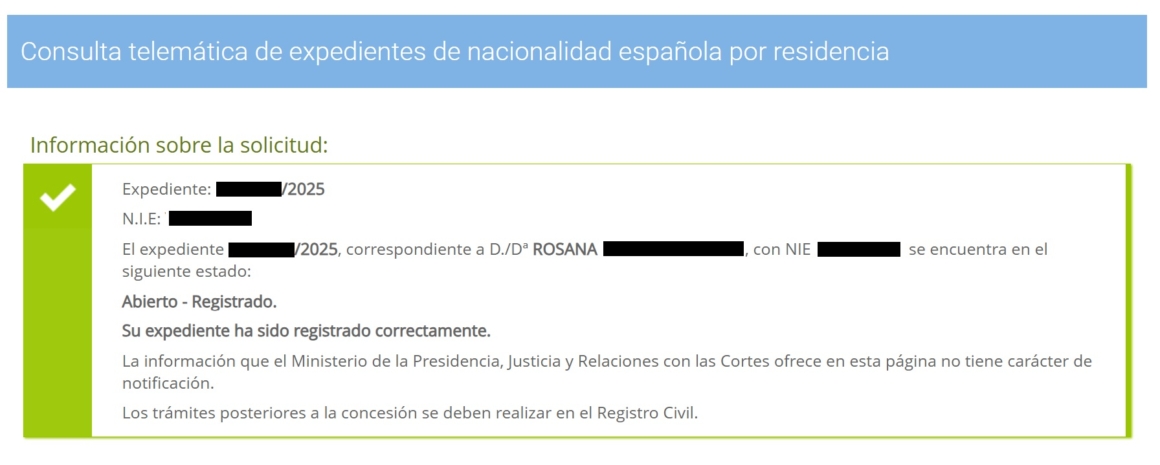
July 22, 2025: I received a positive answer!!!! It took a total of 5 months, relatively fast, given the expected 4 to 12 months. And it is positive!!! Now I have to register it in the Civil Registry that covers Benalmádena, which according to the page of the Ministry of Justice, happens to be in Torremolinos, as we mentioned before. I don’t think I can simply arrive there and do it; I suppose I have to book an appointment, but there is no homepage or information on that. Well, not easy, that is. After trying to find online how to book an appointment, I eventually found this beauty here, which I think can be of great help:
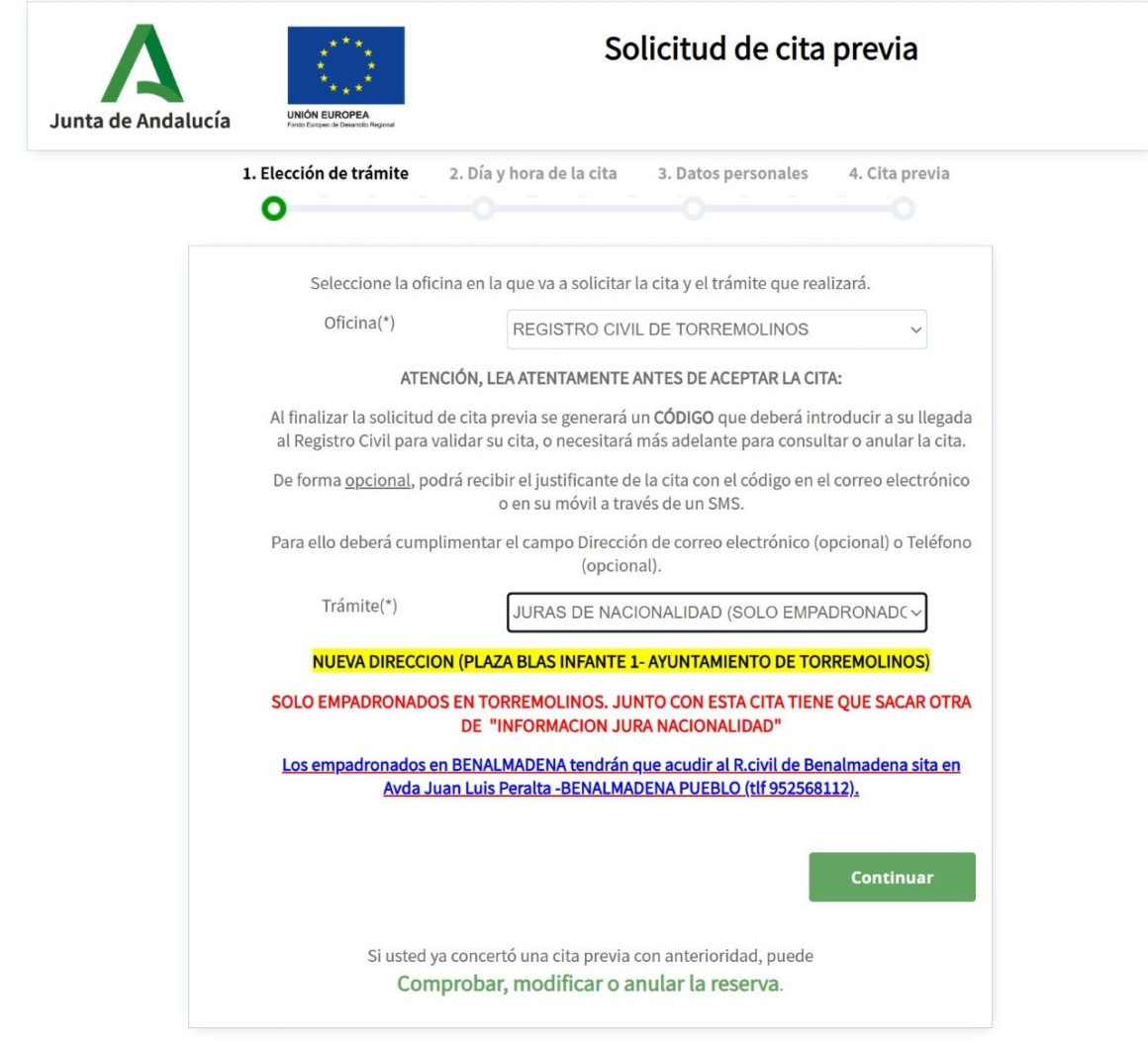
So… I eventually found a place to book an appointment to the Civil Registry of Torremolinos through the Junta de Andalucia page. But they make it clear that they just do nationality-related stuff for those registered in Torremolinos; and say that for those registered in Benalmadena, the place to go is actually the Civil Registry of Benalmadena, in Benalmádena Pueblo – this registry does not appear neither in the page of the Ministry of Justice nor in the list of Registries of the Junta de Andalucía!!! Well, I guess I have 180 days to figure this one out. Here we go!
July 23, 2025: I figured (a bit), and more than that, I went to the Civil Registry of Benalmadena. And it was there and then that I realized that this part of the process, the registration, is harder than I anticipated; for that reason, I added a new post where we focus only on registering the Spanish nationality.
Costs
Document costs vary according to nationality, and the DELE price can vary from one place to the next. Regardless, I’ll leave here my own costs as reference:
– Birth certificate + apostille: € 130
– Criminal record + apostille: € 100
– Sworn translations: (two documents and two apostilles) = 133,10
– CCSE: € 85
– DELE: € 134
– Form 790 026: € 104,05
Total: € 686,15
Conclusion
It is not cheap, and it is quite time consuming, but I hope it will be worth it. If I succeed on my request of Spanish nationality, it means I won’t need to worry about renewing my residence papers or about missing the time to do so. It also means that I will be able to vote in Spain – something I’m looking forward to doing.
More than anything, though, it means something that only females from third world countries can truly understand: I will (probably / hopefully) not be held for extra questioning by immigration every single time I travel to a developed country.

